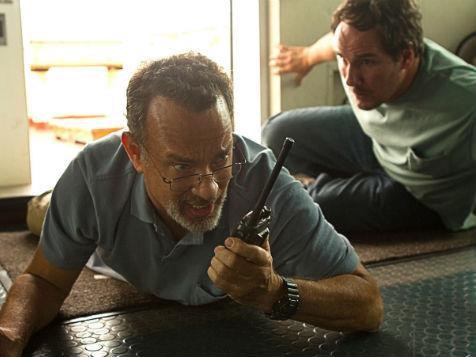‘They’re not here to fish,’ says the eponymous Captain Richard Phillips (Tom Hanks, Cloud Atlas) to his cautious crew, his gaze firmly affixed on the two skiffs filled with gun-toting Somali pirates, each rapidly closing in on his container ship. Their presence, mere moments after the Oman-bound MV Maersk Alabama undertook a training drill centred on such scenarios, is unnerving for the men willing – but not quite expecting – to brave the human dangers of the open seas. As panic lingers, bubbling from a barely-imaginable possibility to a very stark and tangible reality, the vessel’s stoic commander remains the point of calm within the perilous storm.
In Paul Greengrass’ Captain Phillips, the ship’s ordeal – and that of its smart protagonist – is unravelled for the audience to share: every tense moment of life-or-death confrontation, every menacing threat barked down the barrel of a gun, and every mishap of attempted self-preservation is laid out for all to see. The pirates, led by the slight but certain former fisherman Muse (first-timer Barkhad Abdi), descend on the freighter swiftly and surely, determined to earn a healthy ransom. The crew of just 20 sailors can only hide or attempt to hinder the hijacking efforts, anything more daring deferred to their middle-aged, average-Joe leader.
Adapting Richard Phillips’ 2010 memoir A Captain’s Duty: Somali Pirates, Navy SEALs, and Dangerous Days at Sea, a reflection upon his role in the real-life, ripped-from-the-headlines 2009 incident, Greengrass is in his element, the terse, terrifying ordeal the stuff of which his best films have always been made. As the director did with Bloody Sunday and United 93 before, he delves into the dynamic of fear and threats, again stemming from a known, relatable and all-too-human enemy. Dark deeds are waged and desperate situations unfold, but their motivations and machinations are never simple.
By now, the filmmaker’s tricks of the trade are well established, having been glimpsed not only in his depiction of true tales, but in action-oriented Matt Damon vehicles The Bourne Supremacy, The Bourne Ultimatum and Green Zone. Again combat is the preferred context, affording the ideal opportunity for the shaky hand-held shooting, frenetic editing, churning aesthetics and sometimes too-direct dialogue for which Greengrass is known. In again championing the expected style, his latest effort becomes almost indistinguishable from its preceding brethren, the film’s taut technical proficiency suiting the content whilst saddling the on-screen realisation with the unavoidable comparison.
Indeed, for much of Captain Phillips’ extended 134-minute running time, the shadow of the familiar is inescapable, the respectful feature always playing to the director’s type. Within his wearied and wearying frames, chaos becomes controlled and faces come to the fore, the film never deviating from the helmer’s routine. The material – as adapted by screenwriter Billy Ray (The Hunger Games) – retains interest, but it is not until the final act that it combines with Greengrass’ detailed, unglamorous method to elicit its strongest reaction. The movie’s status as the latest pirates-versus-freighters drama, following Danish offering A Hijacking, does little to aid its differentiation.
Once all the groundwork has been laid, all the overt first-versus-third world posturing has become apparent, all the rhetoric clumsily expounded, and all the energetic cuts been expended, the feature’s climax fulfils the potential hinted at but never otherwise realised; so too does the central performance, tasked with establishing the sole current of emotion and empathy in broad strokes for much of the movie, offer Hanks the showcase he has evidently been searching for. The concluding segment is raw, resonant and a reminder of what, sans trappings, the remainder of the film wanted to be. Captain Phillips still immerses and intrigues, still evokes an unrelenting intensity, and still offers a fine re-telling of events that can only come from actuality; what it lacks, in its adherence to Greengrass’ oeuvre, is anything more than the cursory, the immediate and the obvious.
Rating: 3
Captain Phillips
Director: Paul Greengrass
USA, 2013, 134 mins
Release date: October 24
Distributor: Sony
Rated: M
Image: Captain Phillips official website
Actors:
Director:
Format:
Country:
Release:





